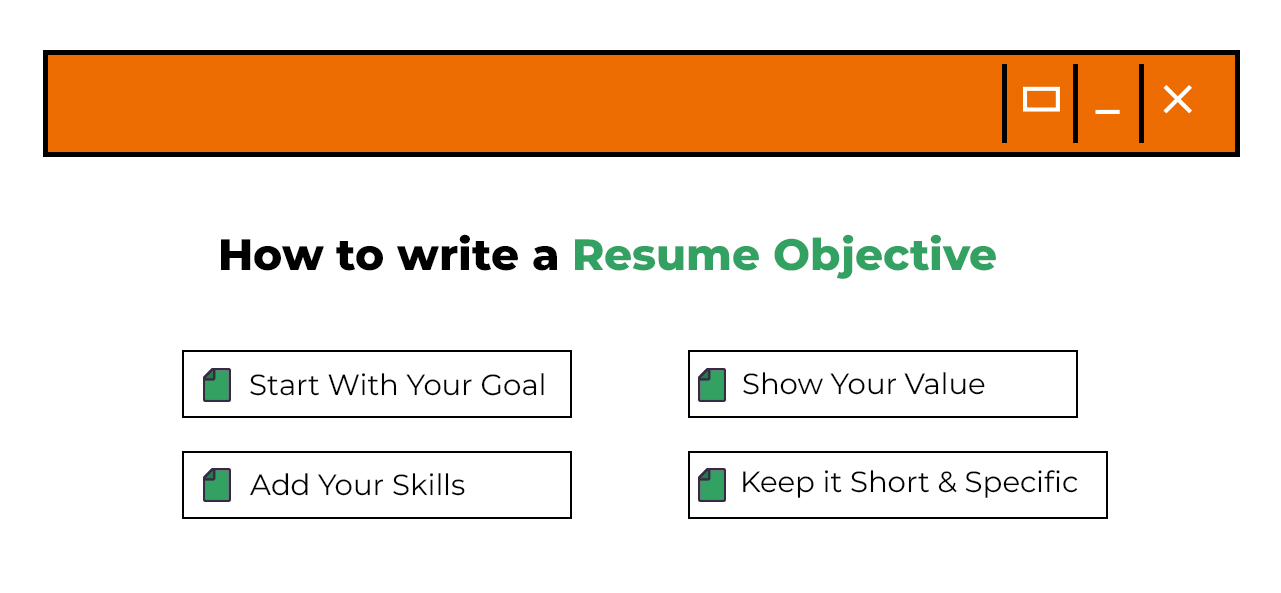A resume objective is a powerful point to make your resume stand out. It is a short statement at the top of your resume that highlights your career goals and what you bring to the table.
Whether you’re a recent graduate, an experienced professional, or someone changing careers, a well-crafted resume objective can help you catch the attention of hiring managers.
This blog explains what a resume objective is and how it differs from a resume summary. It also provides practical examples for different career stages and industries.
You’ll learn how to write a strong resume objective, tips to make it effective, and common mistakes to avoid.
What is a Resume Objective?
A resume objective is a brief introductory statement at the top of your resume. It tells employers your career goals and what you bring to the table.
A good resume objective is clear and specific. It highlights your skills and experience. It also shows how you fit the job you want.
Resume objectives are useful for job seekers at any stage. They help you stand out in a competitive job market.
A strong resume objective can catch the attention of hiring managers. It can make them want to read the rest of your resume.
How Are Resume Objective Examples Helpful?
Resume objective examples tell how to write a clear and effective statement. Examples help you understand what works for different jobs and industries. They also show you how to tailor your objective to match the job description.
Looking at examples can save you time. You can see what other people have done and adapt it to your situation. Examples also help you avoid common mistakes. Moreover, they give you a starting point to create your own unique resume objective.
Difference Between Resume Summary & Resume Objective

Resume summary and resume objective are two different things. However, mostly people confuse the two considering the same thing.
A resume summary is a brief overview of your career. It focuses on your past achievements and skills. It is best for people with work experience.
A resume objective focuses on your future goals. It tells employers what you want to achieve in your career. It is ideal for people new to the workforce or changing careers. Therefore, choose the one that fits your situation.
Get more insights from resume templates in Jump Resume Builder and learn the placement of resume objectives.
Who Should Use a Resume Objective?
A resume objective is best for certain job seekers. Recent graduates can use it to show their potential. Internship seekers can use it to highlight their enthusiasm. People changing careers can use it to explain their new direction.
A study shows that effective resumes include clear objectives. Even experienced professionals can use this because it works well if you want to emphasize a specific goal. For example, you might want to move into a leadership role. A resume objective can help you make that clear.
Career-Wise Resume Objective Examples
Here are some examples for different career stages:
Recent Graduate:
“Recent marketing graduate having a strong academic record and internship experience. Seeking an entry-level position to apply my skills in digital marketing and data analysis.
Eager to contribute to a dynamic team and grow within the company.”
Internship Seeker:
“Dedicated business student having excellent communication and organizational skills. Looking for an internship to gain hands-on experience in project management. Eager to learn and support team success.”
Experienced Professional:
“Sales manager with 10 years of experience in retail and e-commerce. Proven track record of increasing revenue by 20% annually. Seeking a senior leadership role to drive growth and mentor a high-performing team.”
Career Changer:
“Former teacher with strong organizational and communication skills. Transitioning to a career in human resources. Seeking an HR assistant position to apply my people skills and learn the industry.”
Industry-Wise Resume Objective Examples
Here are some industry-specific examples:
Healthcare:
“Certified Nursing Assistant (CNA) with 3 years of expertise in patient care. Seeking a position in a hospital to provide compassionate care and support to patients and families.”
Technology:
“Software developer with expertise in Python and Java. Looking for a role in a tech company to develop innovative solutions and contribute to cutting-edge projects.”
Education:
“Passionate educator with 5 years of teaching experience. Seeking a position as a curriculum coordinator to develop engaging learning materials and support teachers.”
Finance:
“Financial analyst skilled in data analysis and forecasting. Looking for a role in a financial firm to help clients make informed investment decisions.”
How to Write a Resume Objective?

Writing a resume objective is simple if you follow these steps:
- Start with your goal: State the job or role you want.
- Add your skills: Target 2-3 key skills that meet the job requirement.
- Show your value: Explain how you can help the company.
- Keep it short: Aim for 2-3 sentences.
For example:
“Focused and diligent graphic designer with 5 years of experience. Seeking a role at a creative agency to design visually appealing content and help clients achieve their branding goals.”
Tips to Write an Effective Resume Objective
- Be specific: Tailor your objective to the job you want.
- Use keywords: Include words from the job description.
- Focus on the employer: Show how you can help them.
- Keep it concise: Avoid long sentences or unnecessary details.
- Proofread: Check for spelling and grammar errors.
Using tools like Jump Resume Builder can make this process easier. It helps you create a professional resume with a strong objective.
Common Mistakes to Avoid
- Being too vague: Avoid adding generic statements like “I want a job.”
- Focusing only on yourself: Don’t forget to mention how you can help the employer.
- Using cliches: Don’t use cliches and phrases like “hard worker” or “team player” as these are overused.
- Making it too long: Keep it short and to the point.
- Ignoring the job description: Always tailor your objective to the job.
Is a Resume Objective Mandatory?
A resume objective is not always necessary. If you have a strong resume summary, you might not need one.
However, a resume objective can be helpful in certain situations. It is useful for recent graduates, career changers, or people with specific goals.
If you decide to use one, make it strong and relevant. A strong resume objective helps create a positive first impression.
Key Takeaways
- A resume objective is a brief introductory statement that generally comes at the top of your resume.
- It highlights your career goals and what you bring to the job.
- Use it if you are a recent graduate, changing careers, or have a specific goal.
- Tailor it to the job description and keep it concise.
- Avoid common mistakes like being too vague or focusing only on yourself.
A strong resume objective can make a big difference. It can help you get noticed by hiring managers. Take the time to craft a clear and specific statement. It will pay off in your job search.
Using a comprehensive tool can help you create a professional resume with a strong objective. It saves time and ensures your resume stands out.
Need help creating the perfect resume?
Jump Resume Builder makes resume writing fast and easy. Create your resume for free within minutes. Try it now!




